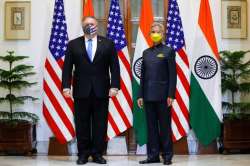BECA deal, China misadventures: Key issues in India-US 2+2 dialogue today
Michael Kugelman, deputy director of the Asia Program at the Wilson Center in Washington, said that there won't be any "big surprises" or "major developments" in the crucial 2+2 meet ahead of the U.S. Presidential election. Kugelman, during his conversation with India TV, noted that such meetings between India and the U.S. would continue even if Joe Biden comes to power.

The Indo-US 2+2 dialogue on Tuesday will have onboard a key landmark defence pact that will provide for sharing of high-end military technology, geospatial maps and classified satellite data between their militaries. Both sides are expected to have on table a plethora of key and strategic issues including China's attempts to expand influence in the Indo-Pacific region as well as its aggressive military manoeuvres in eastern Ladakh. Michael Kugelman, deputy director of the Asia Program at the Wilson Center in Washington, said that there won't be any "big surprises" or "major developments" in the crucial 2+2 meet ahead of the U.S. Presidential election. Kugelman, during his conversation with India TV, noted that such meetings between India and the U.S. would continue even if Joe Biden comes to power.
Earlier on Monday, External Affairs Minister S Jaishankar and his American counterpart Mike Pompeo followed up on their Tokyo discussions, focussed on key bilateral, regional and global issues. Both reviewed progress in bilateral ties over the last four years and expressed satisfaction that they have grown in virtually every domain including trade, energy, defence and education with expanding practice of consultations on foreign policy issues.
Pompeo, along with Defence Secretary Mark Esper, arrived in New Delhi for a two-day visit on Monday.
What's likely to figure
"The expectations for the 2+2 should be relatively modest. It seems like whenever there’s a major bilateral meet, there is buzz about “taking things to a new level.” In reality, we should see this event as an opportunity to put the final touches on BECA, the last remaining foundational agreement, and to reassert support for a revitalized Quad. There will also, I’m sure, be discussion about the shared concern of Beijing and how the two can work together to reduce the threats posed by China in the region. But I don’t know expect any big surprises or major developments," Michael Kugelman told India TV.
BECA, or the Basic Exchange and Cooperation Agreement, is the final of the three basic agreements that the US signs with close partners, enabling interoperability of forces and exchange of sensitive and classified information. BECA is aimed at sharing geospatial information, including nautical and aeronautical charts. This could be in digital of printed format.
ALSO READ | Defence deal inking before US election
How is it significant
The meeting assumes significance as the U.S. Presidential election is just a week away. At this juncture, officials from Donald Trump's administration are here in India. Could this be Trump's "trump card'? Kugelman calls it "Trump government's one last opportunity to put its imprint on the relationship".
"This 2+2 meet is significant in that it marks the last major high-level bilateral engagement during the current Trump administration. It gives the Trump government one last opportunity to put its imprint on a relationship that despite some bumps largely flourished during the last four years. The timing of the meet, so close to the election, is significant too. It can be read as a message from the US that that it won’t let partisan issues like elections get in the way of the partnership."
Bipartisan issues supported by Democrats, Republicans alike
Kugelman said that even if Democratic Joe Biden comes to power, such meetings would continue since bipartisan issues are supported by Democrats and Republicans alike.
"Ultimately, even though this may be the last such meeting with the Trump administration, it’s worth noting that the types of discussions that will take place are certain to continue if there’s a Biden administration. The concerns about China, the support for the Quad, the enthusiasm for US-India security partnership: These are bipartisan issues in Washington, and are supported by Democrats and Republicans alike."
ALSO READ | 'Precision strike': India to get access to US satellite network